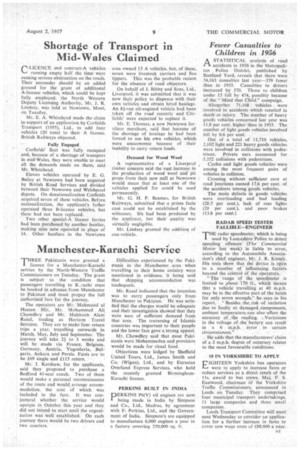Shortage of Transport in Mid-Wales Claimed
Page 41

If you've noticed an error in this article please click here to report it so we can fix it.
C-LICENCE and contract-A vehicles• running empty half the time were causing serious obstruction on the roads. Their surrender should be an added ground for the grant of additional A-licence vehicles, which could be kept fully employed, the North Western Deputy Licensing Authority, Mr. J. R. Lindsay, was told at Newtown, Mont, on Tuesday.
Mr. E. A. Whitehead made the claim in support of an application by Corfields Transport (1955), Ltd., to add four vehicles (20 tons) to their A licence. British Railways objected.
Fully Engaged Corfields' fleet was fully occupied and, because of a shortage of transport in mid-Wales, they were unable to meet all the demands made on them, said Mr. Whitehead.
Eleven vehicles operated by E. G. Bailey at Newtown had been acquired by British Road Services and divided between i their Newtown and Welshpool depots. On denationalization Corfields acquired seven of these vehicles. Before nationalization, the applicant's father operated three B-licence vehicles, but these had not been replaced.
Two other special-A licence lorries had been purchased by another haulier, making nine now operated in place of 14. Other hauliers in the Newtown area owned 13 A vehicles, but, of these, seven were livestock carriers and five tippers. This was the probable reason for the absence of road objectors.
On behalf of J. Bibby and Sons, Ltd., Liverpool, it was submitted that it was now their policy to dispense with their own vehicles and obtain hired haulage. An .8+-ton oil-engined vehicle had been taken off the road recently and Corfields' were expected to replace it.
Mr. E. Thomas, a new Newtown fertilizer merchant, said that because of the shortage of haulage he had been forced to use his own vehicles, which were uneconomic because of their inability to carry return loads.
Demand for Wood Wool A representative of a Liverpool timber concern said the vast increase in the production of wood wool and pit props from their new mill at Newtown would mean that at least one of the vehicles applied for could be used permanently, Mr. G. H. P. Beames. for British 'Railways, submitted that a prima facie case could not be established by the witnesses. Six had been produced by the applicant, but their quality was virtually negligible.
Mr. Lindsay granted the addition of one .vehicle.








































































































